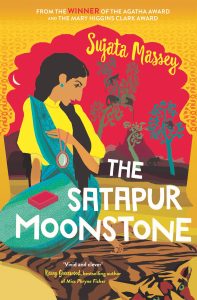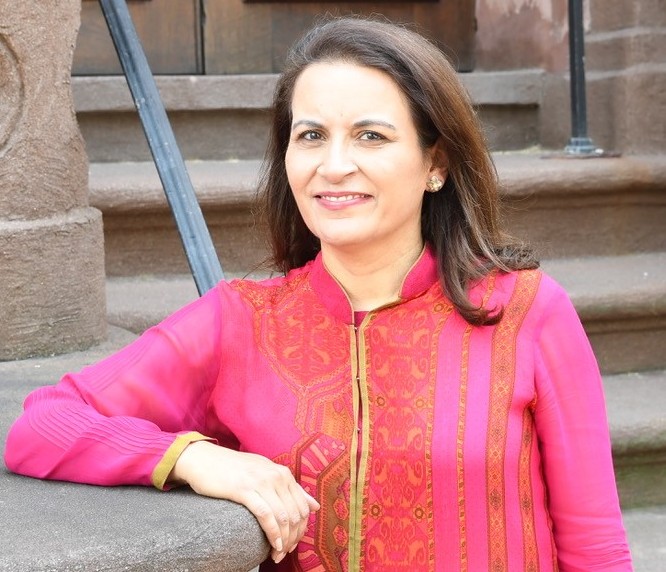Robyn Walton, Sisters in Crime’s Vice-President, spoke to US author Sujata Massey about her new series about a pioneering Indian woman lawyer, A Murder at Malabar Hill (Allen &Unwin, 2019) and The Satapur Moonstone (Allen &Unwin, 2020).
Welcome to Sisters in Crime, Sujata.
Hi Robyn, thanks for inviting me. It’s exciting to connect with Australian Sisters in Crime. I visited Australia in the early 1990s and had such a good time in Perth, the Margaret River area, Bunbury, and Sydney. I was meeting my husband in most of these places; at the time, he was a Navy physician travelling on US ships that were commemorating the Battle of the Coral Seas with the Australian Navy.
Before we investigate the opening novels in your attractive new series, I’m going to ask about your previous books, as readers who’ve missed them may like to chase them up. Firstly, there was your mystery series set in Japan.
I was a fledgling mystery writer during the years that my husband was stationed in Japan. My first mystery series was set in modern Tokyo and featured Rei Shimura, a female amateur sleuth in the art and antiques world. These books explored a lot of Japan’s traditional culture—religion, flower arranging, clothing and food—as well as changing cultural mores, especially for women. I realized as I kept writing how much I was interested in history; mystery alone was not enough for me.
Then came the four books set in South Asia; the first two were not strictly mysteries, were they?
After writing ten books set in Japan that were mysteries, I wanted to completely break and try to write a different kind of book. I was not a free-travelling childless person anymore. I was the mother of two children and our young family was living in the American Midwest, close to my parents, and we became involved in Indian cultural activities. I was attending dance and drumming and language classes with my children, and slowly, story ideas began to awaken for me around the Indian independence movement and women’s history.
The first book was a historical suspense novel called The Sleeping Dictionary, so named because the local women who educated the early colonial men about language and culture were often their live-in paramours and sometimes wives. India Gray Historical Fiction is a collection of short fiction, some mysteries and some not, set in India and Pakistan.
There’s a novella within the collection called Outnumbered at Oxford. This is a prequel mystery about Perveen Mistry, the protagonist in the series I’m writing now. I wrote the prequel so I could better get a handle on her character before I launched into the big book. This kind of writing exercise is helpful if you are inventing a new character you hope is going to be compelling enough to carry a whole series. The icing on the cake is it’s published too!
 And now we have your crime series set in 1920s India. In the first book, A Murder at Malabar Hill (which has also been marketed under the title The Widows of Malabar Hill), you introduce your protagonist, Perveen Mistry. What can you tell us about Perveen and how you were inspired to create this character?
And now we have your crime series set in 1920s India. In the first book, A Murder at Malabar Hill (which has also been marketed under the title The Widows of Malabar Hill), you introduce your protagonist, Perveen Mistry. What can you tell us about Perveen and how you were inspired to create this character?
Perveen Mistry jumped out of a file folder and into my life. Seriously—I had kept article clippings about pioneering women in India, and among these were pieces on India’s first women lawyers: solicitor Cornelia Sorabji and barrister Mithan Tata Lam. These women had strong, supportive parents who pushed for their entrance into universities during slightly different time periods (the 1880s and the 1920s). Both Cornelia and Mithan studied civil law at Oxford University, during the era that women could take courses but were not awarded degrees. (Degrees came in 1923). I read about the kind of cases that Cornelia represented, and also about the kind of work that both she and Mithan did for women’s rights.
All this was inspiration for Perveen Mistry, who lives in 1920s’ Bombay with her family. Perveen is a Parsi, as Indian-born Zoroastrians are called. Zoroastrians, as well as the Jewish community, are said to be the first communities to feel comfortable with their daughters working alongside men in professional positions.
As for the parts of Bombay (now Mumbai) where Perveen works and where she has her first sleuthing adventure, you provide maps and descriptions, and I’m guessing you find old-time Bombay fascinating?
I adore old colonial cities with their great mixes of architecture and the sense of past people that pervade the streets, buildings, and parks. It’s a gift to the world that so many buildings in Bombay have been designated with heritage status and are protected from destruction. Many of the old British colonial buildings are now working Indian government buildings, and old hospitals, hotels, libraries, and some bungalows endure. I try to get inside these places to look around and build literal blueprints for my books.
Perveen’s legal work on Malabar Hill takes her where a male solicitor would not be admitted. Can you tell us more?
In the old days, Indian women could routinely refuse to speak with men to protect their dignity; this tradition was accepted by the colonial government, not because they were woman-friendly, but because they didn’t want Indian men to get angry and rise en masse against them. Some religious communities, like the Muslim merchant family in Malabar Hill and the Hindu royalty in The Satapur Moonstone, restricted women to staying within the home, inside women’s-only quarters called a zenana. Because Perveen is a woman, she can enter the women-only places. She’s got a special advantage that her father, who is in charge of the family law firm, cannot deny—nor can Bombay’s police and the Governor’s Council.
A British colonial authority also lives on Malabar Hill, and Perveen has entrée to his residence through a friendship. This is a connection that will prove helpful in future adventures?
Perveen’s best friend from St Hilda’s College in Oxford is a woman called Alice Hobson-Jones, who grew up in India as the daughter of an Indian Civil Service officer. Alice is the dark sheep of her family for her left-wing social values, her sexual orientation, and her interest in becoming a mathematics professor. Alice is eager to assist Perveen, and it’s quite convenient that Alice’s father is one of the Governor’s Councillors. This leads to a special assignment in the series’ second book, The Satapur Moonstone.
Your storyline includes flashbacks to 1916-17. Can you say something about Perveen’s life back then?
Yes, I felt it important to give background on how this young woman lawyer came to be. In those years, Perveen has just started college. Her father, Jamshedji Mistry, is a prominent solicitor in Bombay and expects one of his children to also become a lawyer. However, Perveen’s older brother Rustom is not suited to the profession. Instead, he goes into the family’s original business, construction. Jamshedji pressures Perveen to enter the Government Law School in Bombay, the oldest law school in Asia; she’s admitted as a special student and is the only female in the school.
Perveen does have a deep interest in law, but the dryness of classes, and the harassment she experiences from males in the program, make law education miserable. She becomes tempted to run off when a handsome young man, Cyrus Sodawalla, coaxes her into stepping away from family expectations. Will she follow love or intellectual passion? Is it possible to have both?
Before we move on to the second novel in the series, is there anything more you’d like to tell prospective readers of A Murder at Malabar Hill?
I love to do research. I feel so fortunate that scholars have scanned a number of important legal texts from colonial India and shared them online; and that a brilliant law professor at the University of Wisconsin, Mitra Sharafi, counselled me on the facts surrounding legal procedure during this time.
I learned that separate legal codes existed for family law for Muslims, Hindus and Sikhs, Parsis, and Christians. A woman could only inherit, or file for a judicial separation or divorce, based on her religion. Some of the legal codes actually permitted a husband to hire a prostitute and/or physically abuse his wife without her being able to have a divorce. Even Perveen, who is so progressive and has supportive parents, finds her life constrained by these rules; and that makes her hell-bent on fighting for the rights of other women.
 Now to The Satapur Moonstone. You take us to a lush, mountainous part of India where a small Hindu kingdom has problems. Again, a “legal lady investigator” is the best person for the case. What’s going on?
Now to The Satapur Moonstone. You take us to a lush, mountainous part of India where a small Hindu kingdom has problems. Again, a “legal lady investigator” is the best person for the case. What’s going on?
Alice’s father, Sir David Hobson-Jones, is a councillor to the Governor of Bombay. He has oversight over the nearby princely states within the Kolhapur Agency (an actual government group that tried to ensure India’s maharajas and nawabs were toeing the line). Some British officers were “residents” in states that were ruled by princes, and they had the power to choose who the princes married and where royal sons were educated—and whether they were judged safe to travel outside of India.
Sir David asks Perveen to visit an isolated palace to advise the government about the young heir. The crown prince’s mother and grandmother are at loggerheads over where he should be educated. Because they are royal Hindu women, they refuse to speak with any males; and this gets Perveen into the case.
Before being conveyed to the palace by palanquin, Perveen stays in the circuit house occupied by the region’s British administrator. This is an important part of your story?
Yes. The Circuit House is a place where legal hearings are held, and it is also an overnight shelter for government travellers. Its chief resident is Colin Sandringham, a young civil servant who is tasked with keeping an eye on the princely state of Satapur. It turns out that Colin and Perveen were in Oxford at the same time, and Colin is excited about it, seeing Peerven as someone he wants to know much better. Perveen knows that her professional reputation could be ruined if she’s suspected of being close to a man, especially a British colonial.
Inside and nearby the palace, Perveen finds herself in several kinds of danger. Can you say a little about the risks of her mission?
Poisoning was extremely common in India’s secluded royal homes; so that is the first thing on Perveen’s mind. She also feels threatened by the Maharani Putlabai, the senior woman in the household, and suspects that the late Maharaja’s brother, a prince with his own, smaller palace, might commit murder in order to become ruler. Perveen worries much about the royal children, Prince Jiva Rao and Princess Padmabai, and also their mother, the Maharani Mirabai, who vanishes shortly after her son disappears. I was a child who loved stories about kingdoms and princesses, so I went into this book with enthusiasm. My research, though, revealed how trapped and unhappy many royal women felt.
Do you foresee more Perveen Mistry novels, or do you wish to take your storytelling in another direction?
I am utterly enthralled with 1920s’ Bombay, so I anticipate writing about Perveen Mistry for a long time. And there are so many exciting events in the early 1920s! Prince Edward VIII spent four months in India on a royal tour, which is the background for book 3. I’m also looking at all the different ways women students, educators, philanthropists, and freedom fighters built the city.
Interestingly, Australia plays a role in the Perveen book I’m writing at the moment (book 4). A number of Australian women married Indian royalty in the late 19th through the mid-20th century. I’ve researched several of these ladies in the hope of bringing an intriguing, yet realistic, character to light.
And colonialism, the way I write it, is not an exercise in nostalgia. People left Europe for places like Australia and Asia because they were forced to, or because they pined for a more unconventional existence or a rise in their standard of living. This meant that colonial places were filled with people redefining themselves. For the local people whose homelands were slowly being changed by foreigners, there was the challenge of deciding whether cooperation would mean a better life or if they should stand against the conquerors. Colonialism is a fact of life in India and cannot be wiped away; my goal is to look at it from all sides, and to think about how what happened is affecting our lives today.
Thanks very much for your responses, Sujata.
Click HERE for more information about Sujata Massey.
